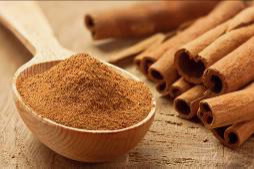FOR IMMEDIATE RELEASE
ACS News Service Weekly PressPac: May 08, 2013
Study on coumarin in cinnamon and cinnamon-based products
“Laser Welding of Ruptured Intestinal Tissue Using Plasmonic Polypeptide Nanocomposite Solders”
Journal of Agricultural and Food Chemistry
Many kinds of cinnamon, cinnamon-flavored foods, beverages and food supplements in the United States use a form of the spice that contains high levels of a natural substance that may cause liver damage in some sensitive people, scientists are reporting. Their study, published in ACS’ Journal of Agricultural and Food Chemistry, found similar results as those published in the European Union.
Ikhlas Khan and colleagues explain that cinnamon, which comes from the bark of certain trees, is one of the most important flavoring agents used in foods and beverages. “True,” or Ceylon, cinnamon is expensive, so most breads, sticky buns and other products in the United States use dried cassia bark, or cassia cinnamon. Ceylon cinnamon contains very little coumarin, a naturally occurring substance that has been linked to liver damage in people sensitive to the substance. However, cassia cinnamon can contain larger amounts. Khan’s team decided to check on the coumarin content of a wide variety of food products.
“As found in this study, coumarin was present, sometimes in substantial amounts, in cinnamon-based food supplements and cinnamon-flavored foods,” they say.
The authors acknowledge funding from the U.S. Food and Drug Administration, the U.S. Department of Agriculture (Agricultural Research Service) and the Global Research Network for Medicinal Plants, King Saud University.
![]()
Contact
Science Inquiries: Michael Woods, Editor, 202-872-6293
General Inquiries: Michael Bernstein, 202-872-6042

foods, beverages and food supplements in the
United States use a form of the spice that
contains high levels of a natural substance
that may cause liver damage in some sensitive
people.

